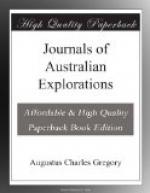Leaving the camp at 6.30 a.m., steered south-east over ironbark ridges of very scrubby character with open grassy valleys; the ridges increased in height, and at 11.0, having reached the most elevated summit, got a view of Peak Range about thirty miles to the north-east; to the north-west the view was obscured by wooded ranges, but from north to east-south-east the country consisted of low-wooded ridges for ten miles, beyond which fine open grassy plains extended from east-north-east to east, along the foot of Peak Range. Descending from the range, followed a small watercourse east-south-east for two hours, and then north-east, and at 2.30 p.m. encamped in a fine grassy flat with a small pool of rainwater in a gully, the larger creek being dry. The country generally consists of low ridges of schist, which, by decomposition, forms a gravelly loam, the gravel being derived from the quartz veins which intersect the schist in all directions. The forest consists of ironbark and acacia; grass everywhere abundant. Many of the horses are very lame from the splinters of dead wood in the scrub, and some have to be relieved entirely of their loads.
Latitude by a Pegasi 22 degrees 48 minutes 17 seconds; longitude by lunar distances 147 degrees 30 minutes 30 seconds.
12th November.
At 7.25 a.m. steered north 110 degrees east, over grassy ironbark ridges, with small watercourses trending north; at 11.0 entered a dense brigalow scrub with a few Moreton-Bay ash-trees, the soil very poor and derived from the decomposition of a coarse conglomerate; small watercourses trending to the south. At 12.45 p.m. emerged from the scrub into open box forest, with limestone and quartz gravel, and a soft black soil producing rather dry scanty grass. At 1.45 entered a well-grassed plain with limestone ridges covered with bottle-tree scrub; the grass was good at this season, green but much mixed with salsola; the summits of Peak Range showed well above the ridges, and from the cliff around the tops seem to be capped with sandstone or more probably porphyry. There being little prospect of finding water in an easterly direction, at 4.0 altered the course to south-east; a heavy squall and thunderstorm brought some rain, but it was all immediately absorbed by the hot dry soil, at 5.0 came to a watercourse trending south, followed it till 6.30, and camped without water; about a mile north from the camp saw a small box-tree marked ab, and near it a large sheet of bark which had been cut about two years before.
Latitude by Saturn 23 degrees 18 seconds.
13th November.
Resumed the journey at 6.20 a.m., steering south down the watercourse; at 7.0 saw some blacks, who, when asked by signs where water could be found, pointed down the creek and into the scrub; at 9.20 came to a pool of rainwater and camped. This part of the country is very poor and scrubby, with large Moreton-Bay ash trees, the soil formed by the decomposition of sandstone and conglomerate, with intervals of schist and trap-rock.




